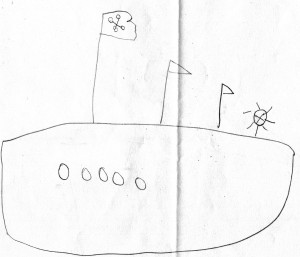We went on a trip to an island a few days ago, and the weather was better than fine. It was a river island, and we went with friends. Many families, many children. The boat took us up wide rivers and down narrow ones and past homes on stilts in Tigre, a delta region outside Buenos Aires.
I went with my wife and three children, who hollered at me to drive faster as we sped to get to the departure dock. They didn’t want to miss the boat and the island and the adventure.
They had no idea what to expect. They only knew that friends would be there and that the trip would be new. They didn’t know what to ask as we waited for the boat to arrive. They played with friends. My eldest girl, who is eight, paired off with a friend, and my son, who is nearly six, ran with the boys as more people arrived before the departure. The youngest girl, nearly three, played with another youngest girl, and together they charmed an older girl, who smiled and laughed and said, “They’re so cute.”
Then we reached the island and a boy fell into the river, a grownup fell down a muddy bank. A boy cut his foot. Others fished on the river. They caught catfish with ham as bait. And cheese. The garden around the house, standing high on stilts, soon became a wild land and the kids ran wildly. The boys chased the girls, and the girls chased the boys. And then many of them jumped into a pool behind the house.
Many of the kids have known each other for years, sharing a commonality of speaking English in Argentina, a land of Spanish.
My son ran with the boys. But not completely with them. He ran alongside them, not fully involved. But very much trying to fit in, copying everything they did. The boys do karate chops. He does karate chops. Now they run that way. And he runs that way. He’s always been this way. Not quite “in.” But he’s accepted that way, as a boy who is with the boys but not fully one of the boys. He’s slow to speak and not always understandable. He cries often; he wails at times. He doesn’t know much about soccer. Not enough to follow a conversation on who won over the weekend, Boca Juniors or River Plate. He’s there but not quite like the rest, and sometimes overlooked in the crowd until he’s remembered.
This sounds harsh. My son is a lovely boy, so too are his friends on the island adventure. But as my son grows, his differences are becoming more recognizable. He has autism. He is finding it harder to keep pace with the boys and their interests that are growing from superheroes to soccer stars. With one friend it’s easier. They play and get along, doing what both boys like, such as a fascination with Indiana Jones and playing getting tied up and having to escape.
But when its a crowded house, he falls out of focus. This is not the fault of the boys. It’s that they are growing up and my son is taking longer, his differences keeping him from invites for play dates, keeping him from making friends, and he’s starting to feel it, to feel different. I hug him. All I want is to make him feel loved and good.
So when we return from the island, tired and starving, I take him out with me on our own to order empanadas at the pizzeria down the road. We’ll take the empanadas home for the family, as a treat after the long adventure. We place the order and I ask for a bottle of Fanta for while we wait, and we sit outside at a table on the sidewalk, father and son. We sip our Fanta, and we watch a soccer match on TV, River against Arsenal, and I ask my son questions about soccer, about who he likes best, and if he likes to play and if he’d like to play with me, but he looks beyond the TV and at two waiters folding boxes for take-out orders of pizza and empanadas, and one carries a stack of 25 past us and into the pizzeria. The other follows with an even larger stake.
“43,” my son says.
“That’s a lot of boxes,” I say.
“I can do that. I can carry 43 at the same time,” my son says, beaming.
The empanadas arrive in one of those boxes and my son looks at the box and I understand.
“Do you want to carry the box?”
“Yeah.”
“All the way home?”
“Yeah.”
He picks it up and carefully carries it as we walk across the street and down the sidewalk and into the house, holding it proudly and with two hands, smiling to show Mummy how he can carry a box home from the pizzeria and with hot empanadas inside.
I smile. This kicks ass on soccer and most anything else. My son is happy.





